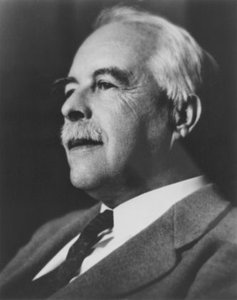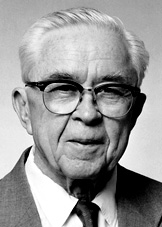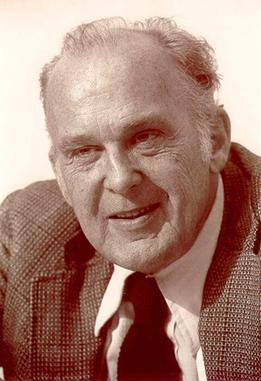Related Research Articles
Human cannibalism is the act or practice of humans eating the flesh or internal organs of other human beings. A person who practices cannibalism is called a cannibal. The meaning of "cannibalism" has been extended into zoology to describe an individual of a species consuming all or part of another individual of the same species as food, including sexual cannibalism.

Gilbert Newton Lewis was an American physical chemist and a dean of the college of chemistry at University of California, Berkeley. Lewis was best known for his discovery of the covalent bond and his concept of electron pairs; his Lewis dot structures and other contributions to valence bond theory have shaped modern theories of chemical bonding. Lewis successfully contributed to chemical thermodynamics, photochemistry, and isotope separation, and is also known for his concept of acids and bases. Lewis also researched on relativity and quantum physics, and in 1926 he coined the term "photon" for the smallest unit of radiant energy.

Glenn Theodore Seaborg was an American chemist whose involvement in the synthesis, discovery and investigation of ten transuranium elements earned him a share of the 1951 Nobel Prize in Chemistry. His work in this area also led to his development of the actinide concept and the arrangement of the actinide series in the periodic table of the elements.

The University of California, Berkeley, is a public land-grant research university in Berkeley, California. It was established in 1868 as the University of California and is the state's first land-grant university and the founding campus of the University of California system. Berkeley has been regarded to be among the top universities in the world.

Ralph Herman Abraham is an American mathematician. He has been a member of the faculty of the University of California, Santa Cruz since 1968.

Edward Butts Lewis was an American geneticist, a corecipient of the 1995 Nobel Prize in Physiology or Medicine. He helped to found the field of evolutionary developmental biology.

Peter Hamilton Raven is an American botanist and environmentalist, notable as the longtime director, now President Emeritus, of the Missouri Botanical Garden.

David Cyril Geary is an American cognitive developmental and evolutionary psychologist with interests in mathematical learning and sex differences. He is currently a Curators’ Professor and Thomas Jefferson Fellow in the Department of Psychological Sciences and Interdisciplinary Neuroscience Program at the University of Missouri in Columbia, Missouri.

Russell Graham Impagliazzo is a professor of computer science at the University of California, San Diego, specializing in computational complexity theory.

Donald Thomas Campbell was an American social scientist. He is noted for his work in methodology. He coined the term evolutionary epistemology and developed a selectionist theory of human creativity. A Review of General Psychology survey, published in 2002, ranked Campbell as the 33rd most cited psychologist of the 20th century.
David Burton Wake was an American herpetologist. He was professor of integrative biology and Director and curator of herpetology of the Museum of Vertebrate Zoology at the University of California, Berkeley. Wake is known for his work on the biology and evolution of salamanders as well as general issues of vertebrate evolutionary biology. He has served as president of the Society for the Study of Evolution, the American Society of Naturalists, and American Society of Zoologists. He was a member of the American Association for the Advancement of Science, the Linnean Society of London, the American Academy of Arts and Sciences, the American Philosophical Society, and in 1998 was elected into the National Academy of Sciences. He was awarded the 2006 Leidy Award from the Academy of Natural Sciences of Philadelphia.

Nicholas B. Dirks is an American academic and the former Chancellor of the University of California, Berkeley. Dirks is the author of numerous books on South Asian history and culture, primarily concerned with the impact of British colonial rule. In June 2020, Dirks was named president and CEO of The New York Academy of Sciences.

Paleolithic religions are a set of spiritual beliefs and practices that are theorized to have appeared during the Paleolithic time period. Paleoanthropologists Andre Leroi-Gourhan and Annette Michelson believe unmistakably religious behavior emerged by the Upper Paleolithic, before 30,000 years ago at the latest, but behavioral patterns such as burial rites that one might characterize as religious — or as ancestral to religious behavior — reach back into the Middle Paleolithic, as early as 300,000 years ago, coinciding with the first appearance of Homo neanderthalensis and possibly Homo naledi.
Daniel Israel Arnon was a Polish-born American plant physiologist and National Medal of Science recipient whose research led to greater insights into the operation of photosynthesis and nutrition in plants.

Harold ("Hal") Warren Lewis was an American Emeritus Professor of Physics and former department chairman at the University of California, Santa Barbara (UCSB). He was chairman of the JASON Defense Advisory Group from 1966 to 1973, and was active in US government investigations into safety of nuclear reactors.

James Lloyd Patton, is an American evolutionary biologist and mammalogist. He is emeritus professor of integrative biology and curator of mammals at the Museum of Vertebrate Zoology, UC Berkeley and has made extensive contributions to the systematics and biogeography of several vertebrate taxa, especially small mammals.

Judith P. Klinman is an American chemist, biochemist, and molecular biologist known for her work on enzyme catalysis. She became the first female professor in the physical sciences at the University of California, Berkeley in 1978, where she is now Professor of the Graduate School and Chancellor's Professor. In 2012, she was awarded the National Medal of Science by President Barack Obama. She is a member of the National Academy of Sciences, American Academy of Arts and Sciences, American Association for the Advancement of Science, and the American Philosophical Society.
Vincent H. Resh is an American entomologist who primarily researches aquatic insects and medical entomology. He was the co-editor of the Annual Review of Entomology from 1991–1997.
Omri Gillath is an Israeli-American social psychologist. As a professor of social psychology at the University of Kansas, Gillath has spent over 20 years doing research, teaching psychology, and mentoring students. He is a leading figure in the field of close relationships and has over 100 publications in peer-reviewed psychology journals. His research interests include: close relationships, attachment theory, brain mechanisms and genetic polymorphisms underlying attachment style, social networks, and recently, humans connections with AI.

Mary Belle Allen was an American botanist, chemist, mycologist, algologist, and plant pathologist, and a pioneer of biochemical microbiology. With Daniel I. Arnon and F. Robert Whatley, she did breakthrough research discovering and demonstrating the role of chloroplasts in photosynthesis. In 1962 she received the Darbaker Prize from the Botanical Society of America for her work on microbial algae. In 1967 she was nominated jointly with Arnon and Whatley for a Nobel Prize.
References
- ↑ (System), University of California (1982). University Bulletin: A Weekly Bulletin for the Staff of the University of California. Office of Official Publications, University of California. p. 122.
- ↑ "Lewis Petrinovich". LC Linked Data Service. Retrieved 2017-10-26.
- ↑ "Lewis F. Petrinovich". San Francisco Chronicle. Retrieved 6 October 2021.
- ↑ "Lewis Petrinovich". MIT Press. Retrieved 2017-10-26.
- 1 2 Berkeley, University of California (1962). Commencement Programme. p. 63.
- ↑ Mastrangelo, Joseph P. (1977-08-13). "Sticking Up for Lefties' Rights". Washington Post. ISSN 0190-8286 . Retrieved 2017-10-26.
- ↑ Bering, Jesse (2010-12-16). "Bite Me". Slate. ISSN 1091-2339 . Retrieved 2017-10-26.
- ↑ Strauss, Mark (2014-08-04). "How Does Evolution Explain Human Cannibalism?". io9. Retrieved 2017-10-26.
- ↑ Singer, Peter (2003-05-15). "Animal Liberation at 30". The New York Review of Books. ISSN 0028-7504 . Retrieved 2017-10-26.
- ↑ The Effect of Strychnine Sulphate on Discrimination Learning in Rats. University of California, Berkeley. 1962.